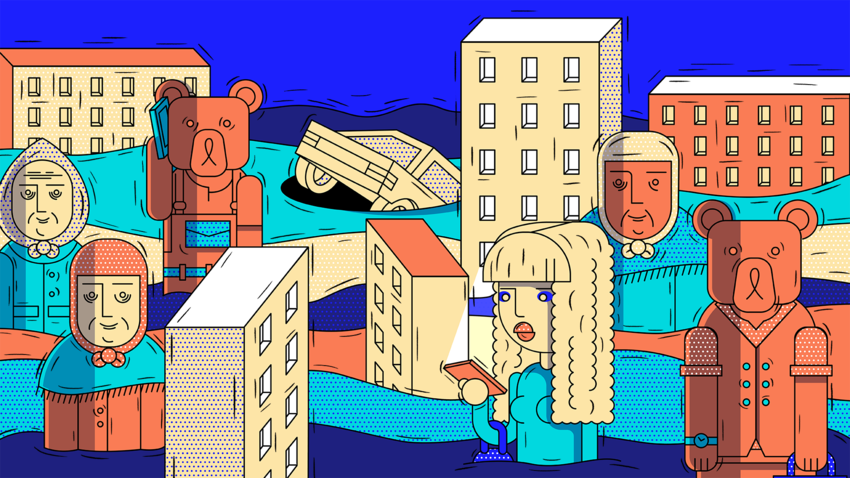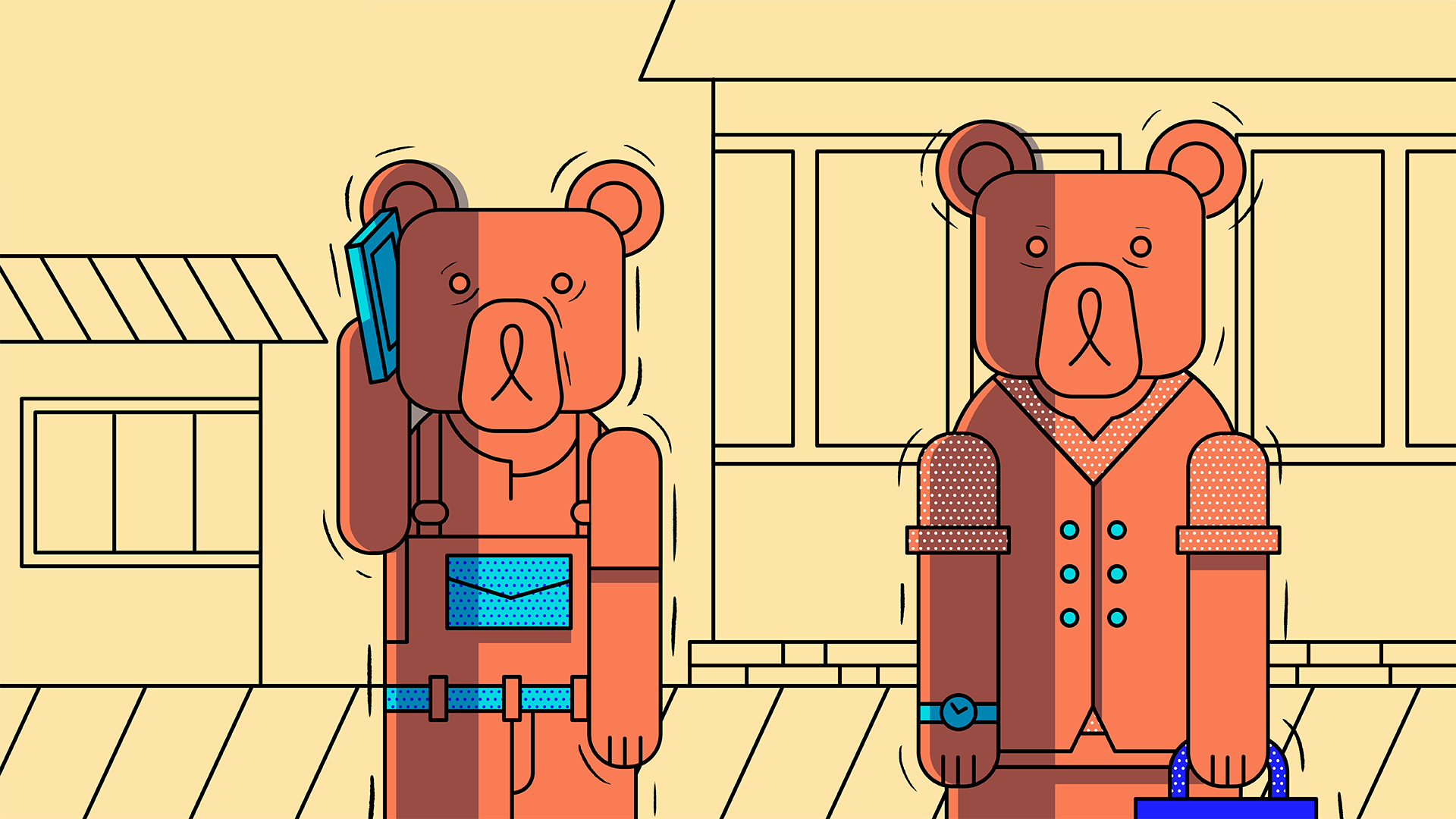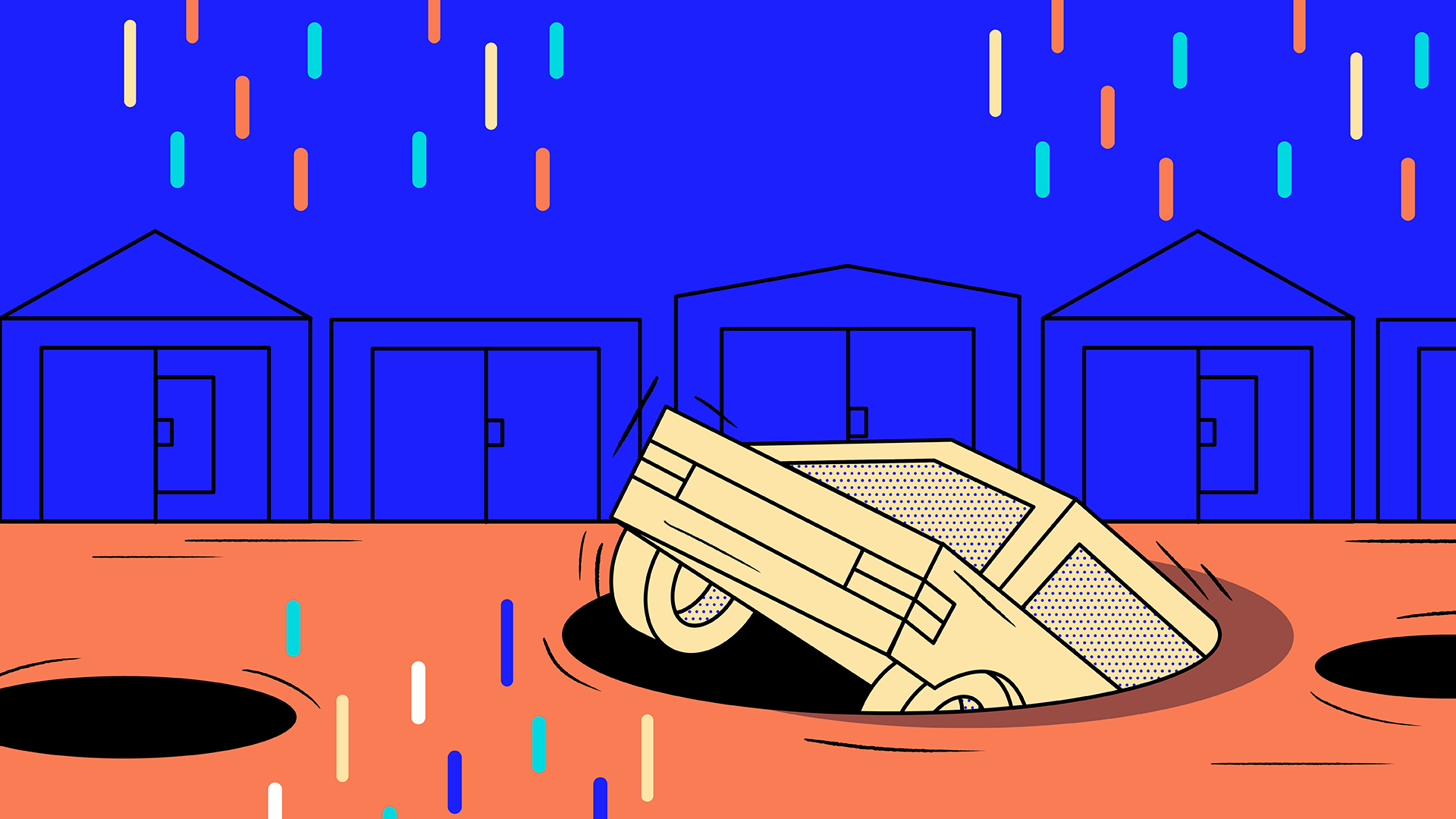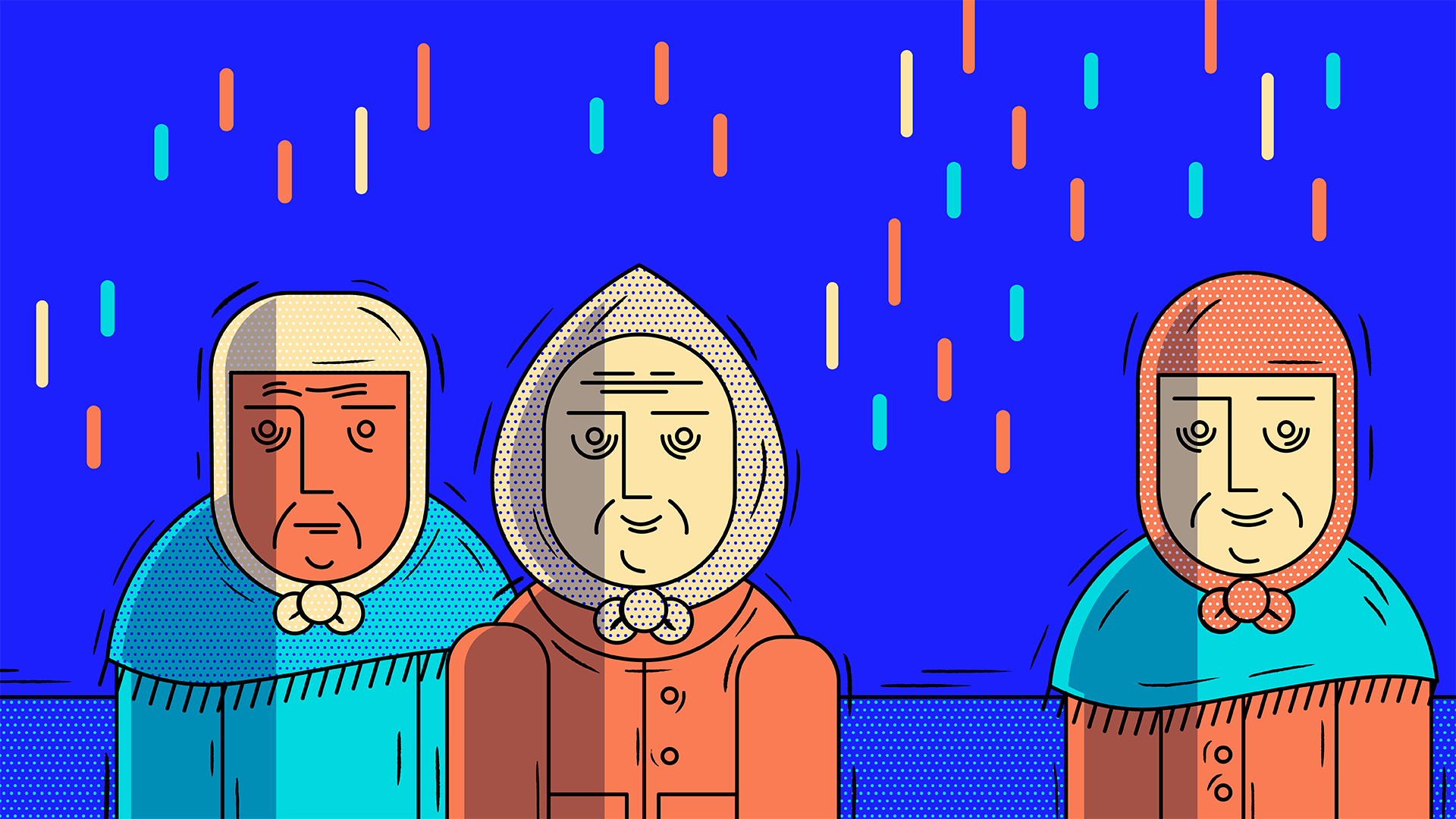
1. Ivan is the most popular Russian name

First of all, it’s not a Russian name. Rather, it’s the eastern Slavic version of an ancient Jewish name. From 2010 to 2016, Ivan ranked sixth on the list of the most popular Russian male names. The top names were Alexander, Sergey and Dmitry. As for female names, the most popular is not Natasha, as you might expect. Rather, it’s Elena, followed by Olga. Natalya (Natasha) is third.
2. Beer is a non-alcoholic drink in Russia

Maybe you’d like it to be, but that’s not the case. The popular misconception dates to 2011 when the Russian government classified beer as an alcoholic drink (in the sense that you’re not allowed to drink beer in the streets, public transportation, etc.) This doesn’t mean that beer wasn’t considered an alcoholic beverage! It’s always been. According to the current law, every drink with an alcohol content greater than 0.5 percent is classified as alcoholic. This rules out kvass and kefir, which contain less than 0.5 percent alcohol.
3. Russians call each other “comrade”

Tovarishch (“comrade”) was a word coined by the Bolsheviks to replace the pre-revolutionary ways of addressing people - gospodin (Mr.), and gospozha (Mrs.). You can also say tovarishch to a woman, but it’s no longer used in colloquial speech. And if you do hear, then it’s usually said with a hint of irony.
4. All Russians wear ushanka hats. And a military waist belt with a buckle. And valenki. And lapti. And a traditional Russian shirt.

You’d be surprised, but there is no “traditional Russian” clothing. The nation is comprised of many nationalities and cultures, and national costumes vary greatly. Ushanka is still good for winter, but it was more popular in Soviet times. When the clothing industry was state-owned, ushankas were produced according to the government’s plan. Today, most people prefer knitted winter hats - you wouldn’t want to wear an ushanka when it’s above 5 F (-15 Celsius); it would just be too warm.
Military belts were very popular in Soviet times, when it was difficult to get a decent belt. Men often used them because they got them as part of their army uniform.
Valenki make good footwear for a snowy village or a walk in the forest, but they get very dirty in the slush of the winter city. Few urban Russians have them at home, but they usually keep a pair at their dacha. Meanwhile, lapti are almost entirely obsolete.
5. All Russians are communists

Communism was a state ideology in Soviet times, and you could get into trouble for opposing it. In the Stalin era, anti-communists were jailed or executed. After 1991, the ideology was discredited, and few people today believe in communist ideas, but this ideology is still popular with older people. While the Communist Party of the Russian Federation only has about 160,000 members, it has had deputies in every session of the State Duma since 1994.
6. It’s very cold in Russia and it snows constantly


Russia has four climatic zones, with temperatures ranging from -83 F (-41 Celsius) in Yakutsk, to 105 F (+41 Celsius) in Astrakhan. So, Russians experience all kinds of weather and temperatures. Yes, in most parts of Russia winter is long and lasts five to six months a year, but big cities tend to be warmer, and thus, urban dwellers encounter more mud than snow in winter. And yes, there is summer in Russia, and it can be suffocatingly hot - even in Siberia!
7. Russians can understand and speak other Slavic languages such as Polish, Czech, Bulgarian, Ukrainian, etc.

To a Western ear these “khh- chh- zhh- shh-” Slavic languages might all seem the same because they belong to the same linguistic group. While there are similarities, there are still significant differences in grammar and vocabulary. Many Russians can understand some spoken Ukrainian, but learning Polish, Czech, Bulgarian or Serbian is a big challenge for a Russian.
8. Russia is poor

While Russia as a country is not poor, most Russians are struggling to make ends meet. Still, things are not that bad. In the ranking of countries by GDP, Russia finishes in 12th place, and the country has over 180,000 U.S. dollar millionaires.
Russia, however, has the greatest income inequality in the world. According to the Accounts Chamber of Russia, in 2017 over 22 million people (about 15 percent of the total population) were living below the poverty level, with about five million people earning less than $1,600 a year.
9. Russian grocery stores are almost empty

Russia is big, and economic conditions vary from region to region, but it’s been more than 20 years since grocery stores were empty. In Moscow, St. Petersburg and other major urban areas one can find even the most expensive superfoods, steaks and upscale alcoholic beverages. Meanwhile, fresh food and groceries are available at farmer markets in every city. Ask a local.
10. The average Russian has trouble with the law, and close ties to the Russian mafia

The Russian mafia is a regular feature in Hollywood films, but in reality Russians see less and less of it. After the tumultuous 1990s, most gangsters have either been jailed or killed, and one very rarely hears gunshots on the streets. Also, you can’t simply join a crime group; ordinary people are distrusted by criminals.
On the contrary, almost a million Russians serve in the police, which is the third largest police force in the world (after China and India), and which represents the largest percentage of policemen per capita (623 policemen for each 100,000 citizens). Many Russians, however, do have “trouble with the law” in the form of unpaid debts or traffic violation fees.
11. Russians say na zdorovie when toasting

Not at all. In fact, the very mention of these words will irritate any English-speaking Russian who’s fed up with this stereotype. It’s ridiculous to say na zdorovie in a toast. These words are usually a response to when someone says spasibo (thank you!). In this sense, na zdorovie is more like saying, “you’re welcome.”
For toasting, Russians might say “...za zdorovie” (“to health”), but it’s becoming increasingly formal these days. Informal short toasts would be like “Davay!” (Let’s do it), “Poekhali!” (Let’s roll), or even the Soviet-era, “Vzdrognem!” (literally “Let’s shudder,” because that’s what you do after emptying a good shot of vodka). And don’t be surprised if after a toast or two, everybody just starts drinking without toasting. It’s completely normal.
12. Bears walk the streets


While it’s nothing unusual if a bear or a moose wander into a remote Russian village or town, bears don’t walk city streets - they’d quickly be shot with a tranquilizer by police. However, one Russian family keeps a bear as a pet.
13. Russians have a mysterious soul

No one in Russia fully understands what the mysterious Russian soul is. The concept was conceived by 19th century Russian writers such as Tolstoy and Dostoevsky, who explored the mystery of Russian ethics and lifestyle in their psychological novels.
The idea of the “Russian soul” says that Russians have their unique way of living, alternative to that of the Western world. In Soviet times, this concept had no place in the Communist worldview, but after perestroika it was re-introduced amid the quest for national identity. The core idea is that, while influenced by both Eastern and Western values, Russia is always choosing its own “third way.” But no one can really pin down what this means.
14. All Russians are under KGB surveillance

The KGB no longer exists. Today, the FSB (Federal Security Service) has inherited many of the KGB’s functions. Since Soviet times the rumor lingers that if you say trigger words, such as “bomb” or “explode” when speaking on a phone, then the police start recording your conversation. But that’s just a legend.
With modern technology - IP address tracking, street and traffic cameras - surveillance has never been easier. But one would have to do something truly threatening to draw the serious attention of the authorities, simply for the fact that surveillance is expensive. A person under surveillance is usually suspected of ties to terrorist activity, which is monitored very thoroughly.
Also, many former KGB officers play significant roles in Russian politics.
15. Russians love vacations at the dacha

‘Love’ is a rather strong word. The main reasons to go to dacha have long been pragmatic. Starting in the 1950s, dachas became a source of food and extra income for many Russians - growing vegetables for oneself, or selling them at local markets. Thus, on weekends the entire family usually spent time at the dacha, cultivating the garden, as well as resting.
Still, even today, when the habit of working at the dacha is less common, most Russians love spending their free time in the countryside. The younger generations, however, usually don’t work in the garden; they had enough of it in their childhood.
16. The roads are in horrible condition


According to the non-profit project, autostrada.info (link in Russian), the country’s roads are a mixed bag. Only 47 percent of federal roads, 39 percent of connecting roads and 39 percent of regional roads are considered “good” by drivers; 47 percent, 43 percent and 39 percent, respectively, say they are “passable;” and 5 percent, 18 percent and 22 percent are ranked as “bad.”
The numbers illustrate that you can’t go anywhere in Russia without having to drive on bad roads, which drivers call “tank testing grounds” because their bumps and holes can be traversed only on a tank.
The bad roads are largely due to incessant construction work throughout the country, with heavy trucks tearing up the roads. Also, the opaque system of road construction still lacks proper supervision. Road flaws remain a major reason for many traffic accidents, but the situation is improving with non-profit projects such as RosYama (link in Russian), which help people file official complaints about bad roads.
17. Russians are extremely superstitious

If you want to test this, try whistling in your Russian friend’s house or give her an even number of flowers. Don’t be offended by the weird looks you might get. Russians are still very superstitious, and they will sit for awhile before a long journey, or look in the mirror if they suddenly have to return home because they forgot something. This is because in pre-revolutionary Russia pagan mystics existed in every village alongside Orthodox priests, and they encouraged these superstitious beliefs.
18. All Russian drivers use a dash cam

As you have certainly seen on YouTube, this is real. In Russia, a dash cam is often your only proof that it was the other driver, and not you, who has caused the traffic accident. Also, it helps to capture weird or funny moments on the road.
19. Russian women: they are beautiful, they always dress up, they are manipulative, and you need a lot of money to date them


You have a small chance of seeing a Russian woman with no makeup if it’s morning and you’re her husband. Even though more and more women adapt light European make-up, the traditions are still strong: most girls start painting their faces as early as in elementary school. Dressing up is and has always been a thing, too. That’s because, as Russian girls say, you never know where you’ll meet your destiny, and so you have to be impeccably dressed even when you go to the store.
All this makes people think that Russian women are manipulative, but that’s only partly true. In courting and relationships, a Russian girl always has a complete image of what her “knight in shining armor” should be like, and she will press her would-be fiancee to comply to her demands. Russian girls believe in love, and if she really likes you, she’ll turn a blind eye to some of your drawbacks.
Winning a Russian girl is never easy (but a bit easier with our guide), and it has little to do with your bank account. It’s better that you prepare your wit, refinement and good manners. In Russian tradition, a boor or a ruffian is never a good partner.
20. Russians are grumpy, evil and cruel

Yes, you can still get yelled at while shopping at a department store in any Russian city, as well as get a cold shoulder from a government office receptionist. At work, your usually friendly colleague might suddenly ignore you altogether in response to your “good morning, how are you?” Well, she’s in a bad mood today. Why is that? Why so grumpy?
Yes, for a foreigner it might be offensive, but grumpiness is a daily thing for Russians, and they don’t think much of it. In stores, bad manners are still a habit from the time when all public services were government-funded. They didn’t need to be nice to clients because there was no commercial competition - you had nowhere to go.
In ordinary communication, it’s still considered insincere to be polite and friendly when you’re not feeling well, disappointed or angry. And for Russians, insincerity is a much greater sin than grumpiness. If you’re insincere, you can’t be trusted. And you’ll be surprised how nice this grumpy shop woman can suddenly be if you say a couple warm words to her. Or she may not. Well, she’s having a really bad day; don’t you see?!
21. Russians smoke a lot

In 2012, Russia was the world’s second-ranking country for smoking, but since the ban on smoking in public places (including cafes and bars) went into effect in 2013, the number of smokers has decreased significantly. Before the ban, an estimated 39 percent of adults in Russia smoked regularly.
A recent study by the Russian Ministry of Health showed that this figure has dropped to 30 percent. The lawmakers are looking forward to banning smoking in shared apartments, in cars (in the presence of children), and etc. But Russians still smoke a lot, men and women alike, and often get fined by police for smoking near metro entrances, on train stations and at playgrounds. Those who don’t smoke regularly, smoke when they drink, but still consider themselves non-smokers! This is a good example of mysterious Russian logic.
22. Russians are great hackers (because they’re good at math)


Indeed, Russia is home to many great mathematicians, from Lobachevsky (whose discoveries made space travel possible) to Grigori Perelman, the recent Fields Medal laureate. That doesn’t mean every Russian can multiply four-digit numbers, but in the upper grades Russian schoolchildren learn very complicated math. Russian students often finish in the top spots in international math and programming competitions. Moreover, most Russian schools include computer science among their core subjects, which is the basis for Russians’ computer skills.
After the collapse of the Soviet Union (and state-funded math research), many talented mathematicians were out of work, so they turned to the emerging IT sphere. Now, most coders and programmers are teens who’ve started coding in their childhood, and it’s prestigious to be an IT guy in Russia. You don’t have to go to a boring office, and instead you just earn money in a manner that seems “easy.” But Russians are also quite lax when it comes to spending.
23. Russians aren’t good at saving

Ever seen a Russian spend lavishly on a party? He must be very wealthy. Most likely, however, far from it. First, big spending is a sign of status in Russia, and most people want to appear to have a higher status than they really do. In Tsarist Russia, a merchant wasn’t considered wealthy if he couldn’t easily lose half his fortune in a card game, or donate a year’s income to the Church.
Thrift has never been a virtue in Russia (except for Old Believers). In Soviet times, there was yet another reason: the Russian monetary system had seen so many financial ‘reforms’ that most people believe it’s very risky to save money because it could suddenly lose its value drastically in just a couple of days.
24. Corruption is rampant in Russia

According to a study by Transparency International, in 2016 about 34 percent of households in Russia had to pay a bribe to gain access to basic services. This is four times more than the same figure for the European Union (9 percent). A survey conducted by PWC says that almost a third of top managers included in the poll encountered corruption and bribery in their business in 2016; bribery is listed as one of the most acute threats to business development in Russia.
In recent years, there’s been an increase in corruption-related criminal cases, with some high-ranking officials and even heads of government ministries accused of bribery. Ordinary citizens, while condemning corruption, still resort to bribery in order to meet their basic needs such as healthcare, proper housing, and etc. Corruption is still a major drawback, just like it was throughout Russia’s history.
25. Russians drink a lot of vodka

As of 2017, Russia ranked sixth in the world for drinking, with males consuming 15.1 liters and women 7.8 liters of alcohol per year. But it’s not so much about the quantity - drinking has been a cultural staple for Russians since the 17th century (you can learn from our review that it hadn’t always been so). In Russia, it’s still considered strange if one doesn’t drink at all. Normally, you just have to have a glass or two on occasions such as weddings, New Year parties, birthday parties and so on.
Drinking vodka is not compulsory, but in certain conditions a shot of strong spirits is helpful. In male adolescent rituals, drinking vodka is seen as a certain initiation and “coming of age.” In business circles, hard drinking is a sign that you’re a person that can be trusted, because your tongue loosens up after a bottle or two (this is a tradition that dates back to the Imperial era, when merchants used to drink heavily in order to smoothly process a good deal). Lately, though, heavy drinking is decreasing because of the growing popularity of a healthy lifestyle. Also, vodka isn’t a must anymore - whiskey, tequila and other spirits are more and more popular.
26. Russia is full of babushkas


According to data from the State Committee for Statistics, there are far more women than men among the oldest segment of the population. For people age 65 to 69, there are 1.5 times more women, and for people over 80, there are three times more women than men. Historically, that’s still the influence of the demographic disaster caused by World War II. Thus, babushkas still prevail.
A babushka sits at home, waiting for her grandchildren to arrive, and she’ll cook them a thousand meals, treat them to old tales, and always worry whether or not they put their hats on when it’s cold. Babushka’ssocial circle are other babushkas, with whom they go for walks, share culinary lifehacks and discuss the gossip on just about every neighbor. Meanwhile, this way of life doesn’t make women less outgoing or less socially active (check out our story about babushkas who defy all stereotypes). But a babushka would never aspire to look younger than she is. “I have seen life, sonny, and I know all about it. By the way, did you put on your hat today? It’s cold.”
27. Tea is the Russian national drink

A stunning 94 percent of Russians drink tea regularly. On average, a Russian drinks three cups of tea a day, while approximately 10 percent drink over six cups of tea daily. And it’s not a new habit. Even in 1903, Anton Chekhov wrote in his story, The Bride: “He drank tea slowly, in Moscow style, seven or so glasses in a row.”
A Russian tea ceremony is simple: there is none! Tea is given at any family gathering, business meeting, scientific conference, and etc. Today, Russians increasingly fancy green and herbal teas, but 86 percent still prefer black tea.
28. The traffic jams in Russia are horrible

As of 2016, Moscow holds second place worldwide in terms of traffic jams. The average Moscow driver spends 91 hours a year in jams (Los Angeles is in first place with 104 hours a year). In Europe, Moscow is the undisputed traffic jam leader. Samara, St. Petersburg, Krasnoyarsk, Ufa, Voronezh and other big cities are also full of jams, and the situation is worsening. The reasons are many: from dire roads conditions to the often illogical organization of intersections, and the overall poor skills of drivers.
Recently, it’s become harder to obtain a driving license in Russia. The tests are more stringent and it’s almost impossible now to buy a license illegally. But there are still many drivers on the road who are extremely inept behind the wheel, and each is capable of paralyzing an entire street or freeway if something goes wrong. The authorities are trying to improve the situation, but the amount of cars per household is growing in Russia, so the jams are here to stay.
If using any of Russia Beyond's content, partly or in full, always provide an active hyperlink to the original material.
Subscribe
to our newsletter!
Get the week's best stories straight to your inbox